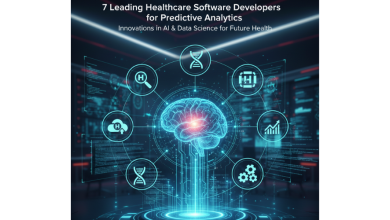
Intelligent technologies such as artificial intelligence (AI) and machine learning (ML) are invaluable resources for a growing number of industries. Within healthcare, innovative technologies such as these, assist healthcare professionals with important decision making and medical information to better understand and treat certain conditions. Additionally, the application of AI and ML has the ability to identify risk groups, discover new drugs and carry out early diagnosis’, whilst predicting the evolution of a virus through mathematical models.
Medical equipment with embedded AI can perform image recognition and natural language processing, making it even more beneficial within the healthcare sector. An example of this is Chatbots, which are utilised to assist professionals to understand mental and physical conditions. The bots collect the necessary information and then advise on conditions and forward cases to medical professionals. This has opened a significant door for the industry, by enabling initial diagnostics to take place at a distance, in a safe way for both patients and health professionals. This has been an invaluable solution throughout the last year when social distancing measures have been in place.
Role of robotics
Many hospitals throughout the UK run on a 24-hour infrastructure, and often need advanced machinery to hand. Examples of this include ventilators, MRI scanners, water pumps, surgical devices, generators, and computers. Automation can be found within this equipment, as it a lot of it usually has modern software embedded. Automation goes hand in hand with efficiency, which is paramount for healthcare professionals – especially when they are short staffed or are at full capacity.
The implementation of robotics in a hospital environment is a relatively recent innovation, which has rapidly increased over the last 10 years or so. AI robots can be incredibly helpful during surgeries, as healthcare workers will often use robotic medication dispensers while undergoing operations. This is another example of intelligent automation, as it provides doctors with a patient’s required medication at the time of need while managing stocks and placing new medication orders when required. The use of robots for surgeries demonstrates huge potential for the industry, as it ensures healthcare professionals are assisted when performing life changing operations.
As society becomes more familiarised with AI and ML, initiatives such as tele-robotics will become a common practice throughout a growing number of institutions. Tele-robotics host a variety of benefits, giving healthcare professionals who are infected during a crisis the chance to connect to hospitals remotely from their homes. By using the embedded video conferencing available in the equipment, they can check in with their patients as and when they see fit. Another innovation is mobile robots which navigate autonomously around hospitals, collecting any rubbish and spraying disinfection liquids throughout corridors – again, a service which has been needed more than ever due to the pandemic.
Taking back control
There are endless benefits that come with utilising AI. One of the key advantages is that it gives humans more clarity when it comes to their health, ultimately reducing the number of health visits. An example of this is consumer applications, which can provide in-depth details about the user’s health choices. The idea behind this is that it allows the user to take control of their overall health and wellbeing in real-time and understand their lifestyle choices. In turn, this puts less strain on the healthcare sector, which has undergone a huge shift over the course of the pandemic.
With a growing number of people becoming savvier towards technological and drug-related innovation, the current generation is set to live longer than any previous one. By enabling individuals to stay independent for longer by reducing the need for hospitalisation and care homes, robots have the potential to revolutionise end-of-life care. Additionally, rapid advancements in AI are giving robots the ability to hold conversations with humans, which is a huge benefit for those who may want or need to keep their minds active for mental health benefits.
Embracing digital transformation
It is safe to say that the healthcare sector is colossal, with a constant stream of innovative technologies fed into it every single day. Despite this, there are major challenges yet to come, and questions around how technology will be able to completely understand the context of a human patient’s needs. Once “situational awareness” is achieved, it is important to understand how a robotic manipulator such as an arm will safely operate in a real-life scenario. With this, image processing is needed to understand real-life situations and objects.
The healthcare industry is incredibly segmented and is expected to continue utilising robotic equipment in the coming years. Eventually, this will lower operational costs and give other hospital institutions access to the technology available. The global pandemic has played a fundamental role in enhancing medical technology innovations such as AI and telehealth platforms within almost every industry. Although the last year has caused many unprecedented challenges, the advancement of technologies has helped drive digital transformation in the healthcare sector.




